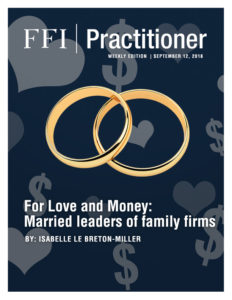
View this edition in our enhanced digital edition format with supporting visual insight and information.
Do married couples make the most effective leaders of family firms? According to research conducted by this week’s contributor, Isabelle Le Breton-Miller of HEC Montréal, firms owned and run by married couples tend to outperform their competition. We hope you enjoy this edition that examines the potential advantages that married copreneurs can bring to a family enterprise.
The family and business aspects of family firms are closely connected, sometimes to the great benefit of collaboration, strong common incentives and mutual loyalties, and a willingness to work diligently and compromise. However, the family dimension in family firms also can create special problems – for example, family conflicts brought into the business, nepotism, exploitation of owners by other owners, and entrenchment of incompetent executives.
In recent research, my colleagues and I (Amore et al. 2017) have shown that one particular type of family business, seems to be able to harness the advantages of family ownership and leadership while avoiding many of the disadvantages. Our research on thousands of family firms in Italy has shown that out of all the family and non-family combinations of ownership and management – lone founders, multiple founders, father/son, mother/daughter, brothers, sisters, cousins, in-laws – firms owned and run by married couples outperform, especially in challenging environments and larger companies. Furthermore, this marital governance arrangement is quite common in some parts of the world. For example, in a study of four European countries – France, Spain, UK and Italy – 23% of 200,000 firms were family enterprises, and among them 41% had married couples as owners, thus accounting for almost half of all family firms there (see the article by Belenzon et al., 2016).
There are several reasons why we suspected that the firms owned and run by married couples would outperform. Unlike blood relatives, marriage partners are together because they have chosen to be together – they have discovered important aspects of compatibility and have made a freely elected, quite critical commitment to share their lives together.
Should they then decide to work together to serve as active principal owners and managers of a business, they have also made a second free choice – to not only share their home lives but their careers. Clearly, most of these individuals like and understand each other, communicate well, share information freely, and are able to collaborate on business matters. They are also acutely aware of each other’s strengths and weaknesses, making it easier to allocate tasks, responsibilities and workloads appropriately, not only within the business, but also at home.
The incentives of married couples typically are very well aligned: they usually share the same bank accounts, the same children, and similar aspirations for the business – a firm that may in fact exist to ensure the economic and social success of the family, its offspring, and perhaps even its later generations. In addition, contrary to family members from different generations and branches, couples experience few conflicts of interests. They also are immune to the agency costs that might be incurred by a leader hired from outside the family. Finally, as opposed to single leaders, married couples often bring a greater diversity of skills and talents and perhaps also different social networks to the business.
Our findings from a study of 1900 large Italian firms (sales of over 50 million euros) from 2000 to 2012 (13,000 observations), shows that family firms in which married couples shared the top management position and possessed controlling ownership demonstrated almost 20% more profits than other companies, family and non-family alike. In fact, they outperform every other combination of family and non-family ownership and management, including that of firms with non-family top executives.
These marital leadership firms perform especially well when they are larger and operate in uncertain and complex environments, suggesting that their human capital is an important contributor to their success. They also do better in industries where networks and social capital are advantageous, for example, those that must bid for large contracts.
In addition, consistent with their long-term orientation, these companies continue to invest more generously in their business during periods of uncertainty and economic disruption. They also have lower employee costs, more profit per employee, and a tendency to avoid layoffs due to over-hiring, all of which suggest an ability to foster a nurturing corporate climate.
As we have stated in Amore et al. (2017): “Taken together, our results suggest that marital leadership can be seen as a special form of shared leadership in which a company enjoys the benefits of having two minds at the top without suffering from the potential limitations such as power struggles, confusion of command, and misaligned interests” (p. 474).
Of course, there are qualifications to these findings. First, the above benefits and conditions apply most strongly to couples who have been married for more than 5 years, and whose difference in age is modest (less than 5 years). Also, we are uncertain as to whether marital firms outside of Italy will share the same benefits, although a study of small firms in four European countries suggests similar tendencies (Belenzon et al., 2016). Certainly, our findings are worth reflecting on by all family businesses.
References
Amore, M., Miller, D., Le Breton-Miller, I. & Corbetta, G. (2017). For Love and Money: Marital Leadership in Family Firms, Journal of Corporate Finance, 46: 461-476.
Belenzon, S.; Patacconi, A. & Zarutskie, R. (2016). Married to the firm? Strategic Management Journal, 37(13): 2611-2638.
About the contributor
 Isabelle Le Breton-Miller is a professor of management and holds the Chair of Succession and Family Enterprise at HEC Montréal. Her research, teaching interests, and publications center on strategies, organization designs, governance structures and succession within family businesses. She has authored more than 50 publications on family firms. Her book, a family business classic, with Danny Miller, Managing for the Long Run (Harvard Business School Press) has been translated into six languages. Since 2016, she has been a member of the College of New Scholars, Artists and Scientists of the Royal Society of Canada, and in 2017 she received, with Danny Miller, the FFI Barbara Hollander Award. She consults with family businesses in the areas of strategy, governance, and succession. She can be reached at isabelle.lebreton@hec.ca.
Isabelle Le Breton-Miller is a professor of management and holds the Chair of Succession and Family Enterprise at HEC Montréal. Her research, teaching interests, and publications center on strategies, organization designs, governance structures and succession within family businesses. She has authored more than 50 publications on family firms. Her book, a family business classic, with Danny Miller, Managing for the Long Run (Harvard Business School Press) has been translated into six languages. Since 2016, she has been a member of the College of New Scholars, Artists and Scientists of the Royal Society of Canada, and in 2017 she received, with Danny Miller, the FFI Barbara Hollander Award. She consults with family businesses in the areas of strategy, governance, and succession. She can be reached at isabelle.lebreton@hec.ca.
About HEC Montréal
HEC Montréal is a French-language university institution offering internationally renowned management education and research. The School has been training future managers who contribute to society’s growth and prosperity, since 1907.

View this edition in our enhanced digital edition format with supporting visual insight and information.





